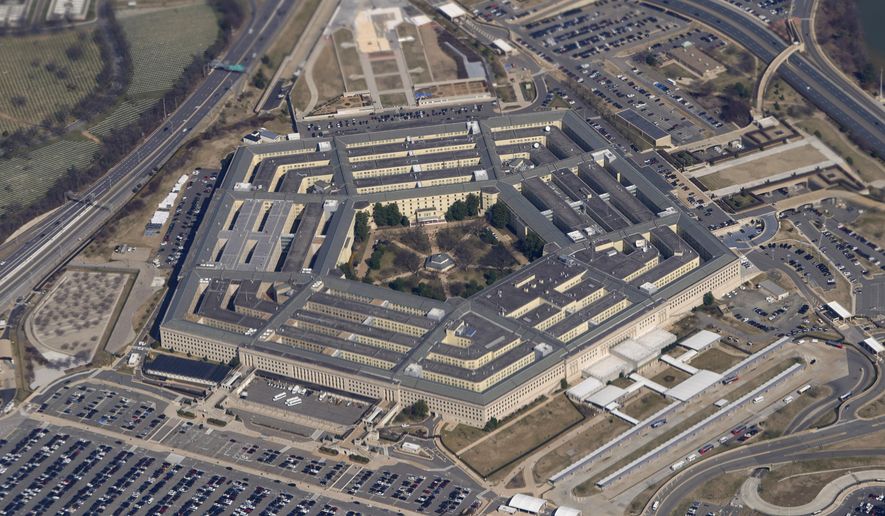A version of this article appeared in the daily Threat Status newsletter from The Washington Times. Click here to receive Threat Status delivered directly to your inbox each weekday.
Frustration is swirling on Capitol Hill after a top Defense Department official revealed that a suspected Iranian influence agent was working at the Pentagon last week while national security officials were coordinating international efforts to defend Israel from a coming Iranian attack.
Sparks flew during a Senate Armed Services Committee hearing last week when Christopher Maier, assistant secretary of defense, told lawmakers that Ariane Tabatabai remained on the job in an office overseeing special operations and irregular warfare despite concerns that she operated at the behest of the Iranian regime.
Lawmakers became suspicious of Ms. Tabatabai’s potential participation in an Iranian regime effort last year when news outlets published alleged details about her in a trove of emails from Iranian diplomats spanning 2003 through 2021.
In September, 31 Republican senators wrote a letter pressing Defense Secretary Lloyd Austin for answers about Ms. Tabatabai’s work at the Pentagon.
Ms. Tabatabai did not respond to a request for comment from The Washington Times.
Concerns about Ms. Tabatabai boiled anew on Capitol Hill on April 10. Sen. Tom Cotton, Arkansas Republican, said the Defense Department assured lawmakers only that protocols were followed regarding Ms. Tabatabai’s work.
Mr. Cotton questioned Mr. Maier, Ms. Tabatabai’s boss, at a Senate Armed Services Committee hearing.
“I’m sure protocols were followed for Aldrich Ames and Robert Hanssen as well,” Mr. Cotton told Mr. Maier. “I think it’s a basic function of our oversight responsibility for us to have more information about Ms. Tabatabai and how someone with these ties to well-known Iranian influence operations ended up working for you.”
Ames and Hanssen are former CIA and FBI employees convicted in federal court of spying for Russia. Mr. Cotton made clear that Mr. Maier, who oversees special operations and low-intensity conflict, was not responsible for Ms. Tabatabai’s hiring but said she served as chief of staff for his office.
“Sen. Cotton, Ms. Tabatabai still is employed in my office,” Mr. Maier said at the hearing. “She is part, like all the other civilians, military, contractors in the department, subject to continuous vetting that’s done by the Defense Counterintelligence and Security Agency. That’s about all that I can provide you in this forum and that’s what I’ve been provided by the folks that are really responsible for security in our department, sir.”
Pressed by Mr. Cotton to give additional details in a closed-door hearing, Mr. Maier said he would provide a bit more in the classified session with senators. A Senate Armed Services Committee spokesman declined to comment when asked whether senators were satisfied with Mr. Maier’s additional testimony.
Whether Ms. Tabatabai had any visibility into the Pentagon’s efforts to stop the Iranian attack on Israel over the weekend is not clear.
National security officials briefed President Biden about Iranian threats to Israel days before the military assault, a senior U.S. official said. The official, who spoke on the condition of anonymity, said the Iranian threats set off an extraordinary level of U.S. military planning to defend the Jewish state.
The threat took priority in the Pentagon and White House. Mr. Austin pulled Mr. Biden aside during the Japanese prime minister’s visit last week to obtain authorization for additional military deployments to assist Israel, the senior official said on Sunday.
The office of the assistant secretary of defense for special operations and low-intensity conflict, which employs Ms. Tabatabai, manages secret programs and has knowledge of U.S. forces operating near Iranian proxies, said Hudson Institute adjunct fellow Garrett Exner.
Mr. Exner wrote for the Hudson Institute last year that he served as a special operations policy adviser to that office for three years and thought an Iranian operative’s presence would endanger special operations forces and could jeopardize diplomatic relations with U.S. allies.
Gabriel Noronha, a fellow at the Jewish Institute for National Security of America, said Pentagon officials told him that European counterparts have refused to take meetings when Ms. Tabatabai participates because of concerns about leaks of sensitive information.
Mr. Noronha told The Washington Times that the Pentagon must reevaluate its approach to security investigations.
“In Ms. Tabatabai’s case, the public evidence alone is clear: She has close family connections and professional association with the regime’s senior leadership that should disqualify her from receiving a security clearance, which is a privilege and not a right,” Mr. Noronha said.
The British-based Iran International media outlet published details of Ms. Tabatabai’s alleged connections to Iran last year. The publication said Ms. Tabatabai participated in a network of academics and researchers privately working with the Iranian Foreign Ministry.
Iran International said it obtained the communications of Mostafa Zahrani, a member of Iran’s Islamic Revolutionary Guard Corps, that showed Ms. Tabatabai seeking Tehran’s advice on matters such as trips to Israel and participation in various conferences.
Ms. Tabatabai served in 2021 and 2022 as an adviser to Robert Malley, a Biden administration official on leave from the State Department whose security clearance was suspended, Iran International reported. The publication said she accompanied Mr. Malley to nuclear negotiations in Vienna in 2021.
Biden administration officials have dismissed concerns about Ms. Tabatabai. A Pentagon official told The Times in September that she was thoroughly and properly vetted and that the U.S. government was “honored to have her serve.”
Tension between Israel and Iran remains severe and could worsen. Richard W. Rahn, chairman of the Institute for Global Economic Growth, wrote for The Times in February that intelligence estimates suggest Iran could soon have nuclear weapons. He estimated as many as a dozen by May.
• Ryan Lovelace can be reached at rlovelace@washingtontimes.com.




Please read our comment policy before commenting.